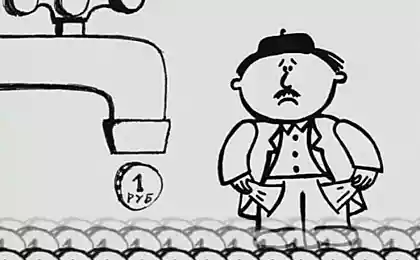458
How to save 20 hours per week
There are several indicators which make it possible to learn a successful person. One of the main — Successful Man does not complain about lack of time, because he knows that a week consists of 168 hours, and you can use them so that was enough for all planned Affairs.
And it's not just in the usual primemax time management. There is an interesting technique — "two hours" — it is not as well known as others but very effective. It does not affect the strength of will or discipline, but on our perception of ourselves — takes into account the brain and therefore helps to obtain dramatic results: for example, saving 20 hours a week for personal needs or to increase their income by 30, 50 and sometimes 300%. What you need to do in those two hours?

Once a week you allocate yourself two hours of free time, armed with a planning tool. It could be Outlook, Google Calendar, iCal or any digital tool of your choice. Can use a regular paper calendar if you prefer.
Step 1. Remember everything: refreshed of purpose. The problem with many people is that they rarely remember their key goal, and therefore constantly deviate from the route. Take first 10 minutes to repeat his Main goal. Imagine how you achieve it. Look forward to seeing how your goals come to life in my head.
Step 2. The planned meeting. In the second step, we recall the meetings that we have planned. Now ask yourself some questions about the upcoming works: What are the results desirable? Do we need all this meeting? Invited whether she needs people? How to get the most out of this time? Do I have to reduce this period? Maybe extend? What preparations are required?
Record missing items. Give this step your undivided attention. Good preparation for meetings is half the battle.
Step 3. The time for me. One of the most important steps is to schedule time for self-improvement. It's time for personal development. It could be sports, reading, meditation and goal setting. This also can add full communion with family or friends, social activities. All these actions definitely need to plan, otherwise they will disappear from your life because they will be replaced "very unimportant, but urgent matters".
Step 4. The planned "green time". "Green time" is the time of money, that is the work that brings you the main income. If you think about it, in your work there are a few actions that directly bring you income. If you are a Manager, it management company or Department, and all. If you are a seller, this sale, and all. If you are an athlete, it is training and performances, and all. Even in large companies there is one reason you specified in payroll, and that's it. Plan "green time" — time when you are engaged in the direct duties, and protect it!
Step 5. The planned "red time". "Red time" or "institutional time" is also part of professional activities. It is time that you do not pay directly, but it helps to efficiently perform the duties of "green time". For example, in "red time" research performed, preparations are made for the presentation, classification of potential customers, documentation, effectiveness assessment and other supporting actions. "Red time" also need to plan, otherwise the signal "stop" will not let you off the traffic lights during the green time."
Step 6. The time of rest. Allow time for recovery. It is best to spend this time alone, to think about something to dream, or just to get some fresh air. Take care of yourself, your mind, body and spirit. And Yes — it is also necessary to plan. Otherwise, in pursuit of the goal you just drain all stamina and will not get anything but tired.
Step 7. Finish: "flexible time". Once you do the first six steps, you will notice a wonderful thing: your calendar is still "Islands" of free time. You see these "gaps"? They are even the most busy people: an hour here, three hours there, two somewhere else. Now those gaps — your storage time. You can fill in anything: current projects, meetings, additional time for improvement.
As you can see, if you devote two hours a week to properly plan, then life will be easier and more fun! Do this weekly, and you will see how you will cease to use that trite phrase: "I Have no time!"
Source: efamily.ru
And it's not just in the usual primemax time management. There is an interesting technique — "two hours" — it is not as well known as others but very effective. It does not affect the strength of will or discipline, but on our perception of ourselves — takes into account the brain and therefore helps to obtain dramatic results: for example, saving 20 hours a week for personal needs or to increase their income by 30, 50 and sometimes 300%. What you need to do in those two hours?

Once a week you allocate yourself two hours of free time, armed with a planning tool. It could be Outlook, Google Calendar, iCal or any digital tool of your choice. Can use a regular paper calendar if you prefer.
Step 1. Remember everything: refreshed of purpose. The problem with many people is that they rarely remember their key goal, and therefore constantly deviate from the route. Take first 10 minutes to repeat his Main goal. Imagine how you achieve it. Look forward to seeing how your goals come to life in my head.
Step 2. The planned meeting. In the second step, we recall the meetings that we have planned. Now ask yourself some questions about the upcoming works: What are the results desirable? Do we need all this meeting? Invited whether she needs people? How to get the most out of this time? Do I have to reduce this period? Maybe extend? What preparations are required?
Record missing items. Give this step your undivided attention. Good preparation for meetings is half the battle.
Step 3. The time for me. One of the most important steps is to schedule time for self-improvement. It's time for personal development. It could be sports, reading, meditation and goal setting. This also can add full communion with family or friends, social activities. All these actions definitely need to plan, otherwise they will disappear from your life because they will be replaced "very unimportant, but urgent matters".
Step 4. The planned "green time". "Green time" is the time of money, that is the work that brings you the main income. If you think about it, in your work there are a few actions that directly bring you income. If you are a Manager, it management company or Department, and all. If you are a seller, this sale, and all. If you are an athlete, it is training and performances, and all. Even in large companies there is one reason you specified in payroll, and that's it. Plan "green time" — time when you are engaged in the direct duties, and protect it!
Step 5. The planned "red time". "Red time" or "institutional time" is also part of professional activities. It is time that you do not pay directly, but it helps to efficiently perform the duties of "green time". For example, in "red time" research performed, preparations are made for the presentation, classification of potential customers, documentation, effectiveness assessment and other supporting actions. "Red time" also need to plan, otherwise the signal "stop" will not let you off the traffic lights during the green time."
Step 6. The time of rest. Allow time for recovery. It is best to spend this time alone, to think about something to dream, or just to get some fresh air. Take care of yourself, your mind, body and spirit. And Yes — it is also necessary to plan. Otherwise, in pursuit of the goal you just drain all stamina and will not get anything but tired.
Step 7. Finish: "flexible time". Once you do the first six steps, you will notice a wonderful thing: your calendar is still "Islands" of free time. You see these "gaps"? They are even the most busy people: an hour here, three hours there, two somewhere else. Now those gaps — your storage time. You can fill in anything: current projects, meetings, additional time for improvement.
As you can see, if you devote two hours a week to properly plan, then life will be easier and more fun! Do this weekly, and you will see how you will cease to use that trite phrase: "I Have no time!"
Source: efamily.ru
























